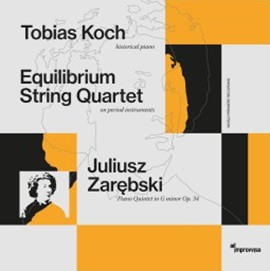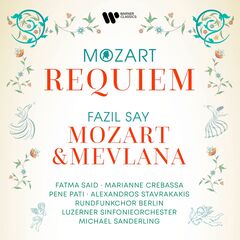Wilde Wut und verinnerlichte, tief bewegende Zärtlichkeit: das sind die Eckwerte von Michael Sanderlings kontrastreicher und nahe am Text verankerter Interpretation des Mozart Requiems. Sanderling benutzt relativ schnelle Tempi, ohne je zu überziehen und nutzt die Dynamik zu einer effizienten Dramatisierung des Requiems.
Die ausgezeichneten Solisten werden in den ganzen Ablauf in idealer Weise eingebunden, dienend, nicht auftrumpfend. Ebenso perfekt ist die Balance zwischen Chor und Orchester. Dieser Chor, der total engagiert singende Berliner Rundfunkchor, ist ein eindeutiger Gewinn für diese Aufnahme, die eine insgesamt kraftvolle, lebendige Darbietung auf hohem Niveau bietet.
Das 25 Minuten dauernde ‘Mozart ve Mevlana’ des Türken Fazil Say ist eine Vertonung zweier Gedichte des Sufi-Dichters Rumi aus dem 13. Jahrhundert. Rumis vollständiger Titel auf Türkisch lautet Mevlânâ Celâleddîn-i Rûmî (Mevlânâ bedeutet ‘Unser Meister’ und Rûmî weist auf seine Verbindung zu Anatolien hin). Die vertonten Gedichte Yine Gel (Komm wieder) und Yedi Öğüt (Die sieben Prinzipien) sind ein Plädoyer für Toleranz und Großzügigkeit des Geistes.
Say setzt in seiner Partitur die gleichen instrumentalen und vokalen Kräfte ein wie Mozart in seinem Requiem und stellt klare musikalische Bezüge zum Requiem und zu anderen Werken Mozarts her. Darüber hinaus integriert er Instrumente, Rhythmen und Harmonien aus der anatolischen Kultur.
So kam ein originelles Werk zustande dessen erster Teil dem Schlagwerk eine wichtige Rolle zugesteht und sehr rhythmisch ist. Der sehr lyrisch singende Chor bleibt im Kontrast dazu im Hintergrund. Die Solisten haben im ersten Satz eine eher bescheidene Rollen zu spielen, treten aber im zweiten Teil stärker in Erscheinung. Alle vier meistern ihren Part absolut hinreißend. Auch sie singen vor einem obsessiv im Hintergrund hämmernden Schlagzeug.
Nun kann ich nicht verschweigen, dass ich mit diesem Stück ein Problem habe: wenn ich die Texte im Booklet lese, finde ich, dass die Musik aber auch gar nicht zu diesen Texten passt.
Ich will nicht sagen, dass die Musik nicht gut ist und gute Ideen enthält. Alles klingt gut und prägt sich einem leicht ein, aber wenn ich es in Verbindung mit Rumis Texten bringe, ergibt sich eine Diskrepanz.
Wild fury and interiorized, deeply moving tenderness: these are the cornerstones of Michael Sanderling’s interpretation of the Mozart Requiem, which is rich in contrast and anchored close to the text. Sanderling uses relatively fast tempi without ever overdoing it and uses the dynamics to efficiently dramatize the Requiem.
The excellent soloists are ideally integrated into the whole process, serving rather than showing off. The balance between choir and orchestra is equally perfect. This choir, the totally committed Berlin Radio Choir, is a definite asset to this recording, which offers an overall powerful, lively performance at a high level.
The 25-minute ‘Mozart ve Mevlana’ by the Turk Fazil Say is a setting of two poems by the 13th century Sufi poet Rumi. Rumi’s full title in Turkish is Mevlânâ Celâleddîn-i Rûmî (Mevlânâ means ‘Our Master’ and Rûmî refers to his connection to Anatolia). The poems Yine Gel (Come Again) and Yedi Öğüt (The Seven Principles) set to music are a plea for tolerance and generosity of spirit.
Say uses the same instrumental and vocal forces in his score as Mozart in his Requiem and makes clear musical references to the Requiem and other works by Mozart. He also integrates instruments, rhythms and harmonies from Anatolian culture.
The result is an original work whose first part gives the percussion an important role and is very rhythmic. In contrast, the choir, which sings very lyrically, remains in the background. The soloists have a rather modest role to play in the first movement, but become more prominent in the second part. All four master their parts absolutely ravishingly. They also sing in front of obsessively pounding percussion in the background.
Now I can’t hide the fact that I have a problem with this piece: when I read the texts in the booklet, I find that the music doesn’t fit these texts at all.
I don’t want to say that the music isn’t good and doesn’t contain good ideas. Everything sounds good and is easy to memorize, but when I put it in connection with Rumi’s lyrics, there is a discrepancy.























